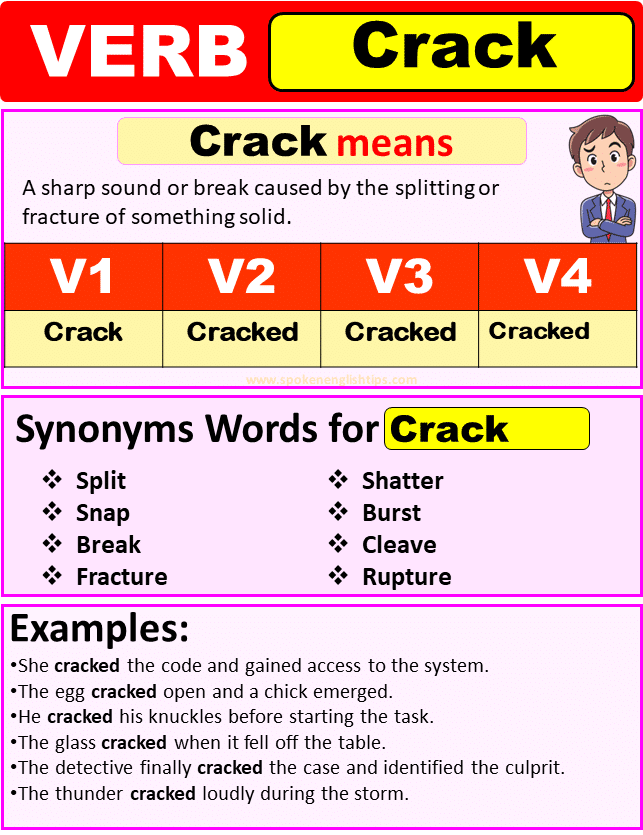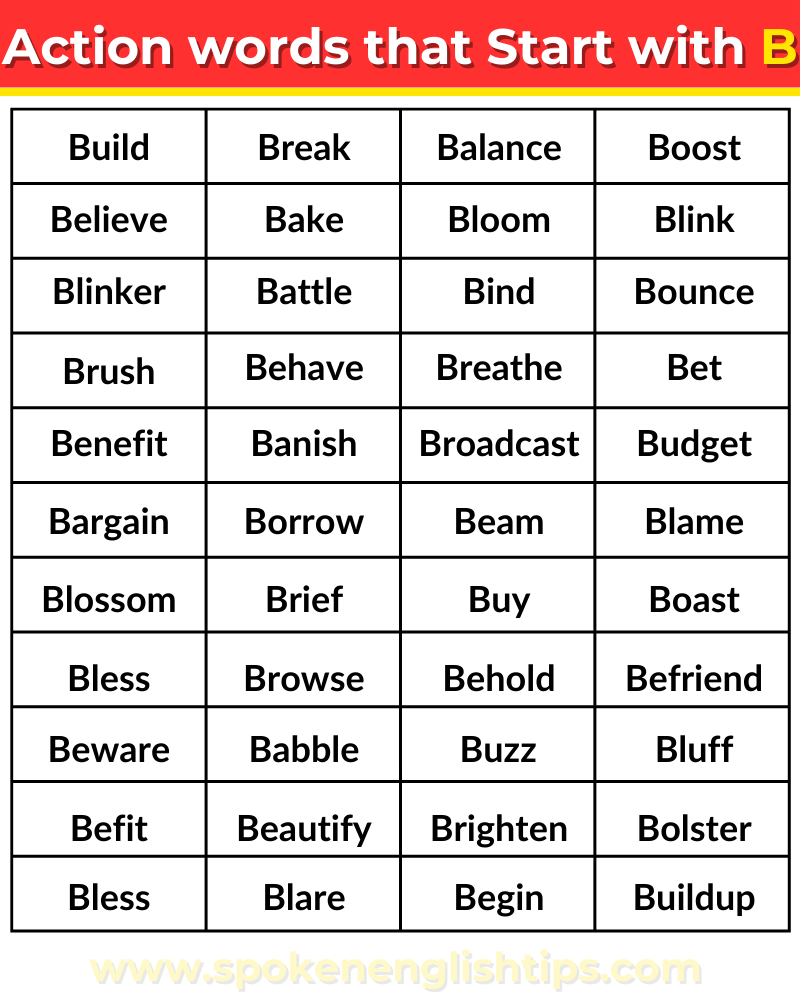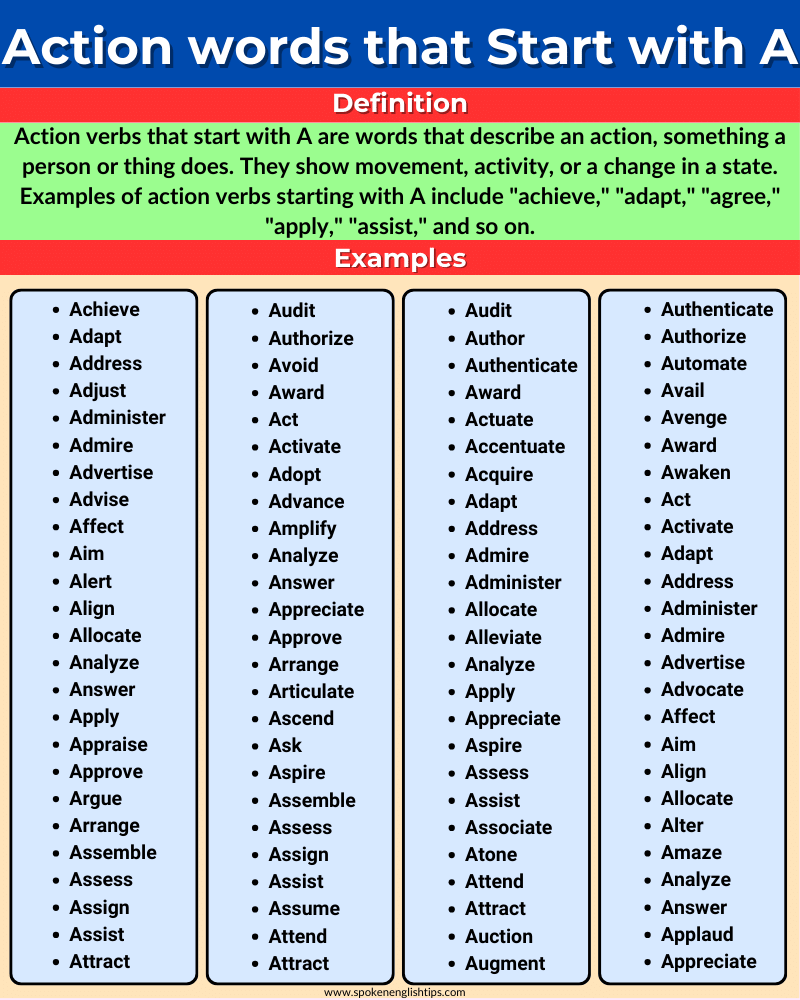Crack past tense is cracked. Let’s discover all verb forms with past participle V1 V2 V3 V4 V5
| 1. | Base Form (Infinitive) (V1): | Crack |
| 2. | Simple Past (V2): | Cracked |
| 3. | Past Participle (V3): | Cracked |
| 4. | Present Participle ( V4 -ing): | Cracking |
| 5. | 3rd Person Singular: | Cracks |

See Also | List of Verbs V1 V2 V3 V4 Pdf Download
Crack Past Tense
| Cracked |
| Cracked is the past tense of the Crack word. |
Crack Past Participle
| Cracked |
| Cracked is the past participle of the Crack word. |
Crack Verb forms V1 V2 V3 V4
| Infinitive | Past Simple | Past Participle | Present Participle |
| Crack | Cracked | Cracked | Cracking |
Conjugation of Crack
| Tense | Conjugation | Example Sentence |
|---|---|---|
| Present Indefinite | crack | He cracks nuts with a hammer. |
| Present Continuous | is cracking / are cracking | She is cracking jokes at the party. |
| Present Perfect | has cracked / have cracked | They have cracked the secret code. |
| Present Perfect Continuous | has been cracking / have been cracking | He has been cracking jokes all evening. |
| Past Indefinite | cracked | I cracked the eggs into a bowl. |
| Past Continuous | was cracking / were cracking | She was cracking jokes all night. |
| Past Perfect | had cracked | They had cracked the safe before the alarm went off. |
| Past Perfect Continuous | had been cracking | He had been cracking jokes for hours before the show started. |
| Future Indefinite | will crack | She will crack the code and solve the puzzle. |
| Future Continuous | will be cracking | They will be cracking jokes at the comedy club tonight. |
| Future Perfect | will have cracked | I will have cracked the case by tomorrow. |
| Future Perfect Continuous | will have been cracking | He will have been cracking jokes for years by then. |
Synonyms of Crack
- Split
- Snap
- Break
- Fracture
- Shatter
- Burst
- Cleave
- Rupture
Crack Verb Examples With V1 V2 V3
- She cracked the code and gained access to the system.
- The egg cracked open and a chick emerged.
- He cracked his knuckles before starting the task.
- The glass cracked when it fell off the table.
- The detective finally cracked the case and identified the culprit.
- The thunder cracked loudly during the storm.
- She cracked a smile when she saw the surprise.
- The whip cracked in the air as the cowboy rode by.
- He cracked a joke that made everyone laugh.
- The ice on the lake cracked under the weight of the skaters.
Read Also More Verbs:
- Build Verb Forms
- Brush Verb Forms
- Breathe Verb Forms
- Break Verb Forms
- Box Verb Forms
- Bow Verb Forms
- Bounce Verb Forms
- Borrow Verb Forms
- Boil Verb Forms
- Blow Verb Forms
Frequently Asked Questions
Q: What does the verb “cover” mean?
A: The verb “cover” means to place or spread something over or across a surface.
Q: What are the three forms of the verb “cover”?
A: The three forms of the verb “cover” are: V1 (base form): cover, V2 (past tense): covered, V3 (past participle): covered.
Q: How is the base form (V1) of “cover” used in a sentence?
A: The base form (V1) of “cover” is used when the action is taking place in the present or as a general statement. For example: “I cover my plants during the winter.”
Q: How is the past tense (V2) of “cover” used in a sentence?
A: The past tense (V2) of “cover” is used when the action happened in the past. For example: “She covered the cake with frosting yesterday.”
Q: How is the past participle (V3) of “cover” used in a sentence?
A: The past participle (V3) of “cover” is used to form the present perfect tense or the passive voice. For example: “They have covered the books with protective jackets.” or “The table was covered with a tablecloth.”
Q: Can you provide some examples of sentences using “cover” in different forms?
A:
V1 (base form): “I cover my swimming pool during the winter.”
V2 (past tense): “He covered the car with a tarpaulin.”
V3 (past participle): “The floor was covered in a thick layer of snow.”
Q: Are there any irregularities in the verb “cover” when it comes to its different forms?
A: No, the verb “cover” is a regular verb, so it follows the standard conjugation pattern for regular verbs in English.


